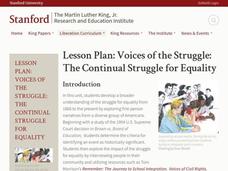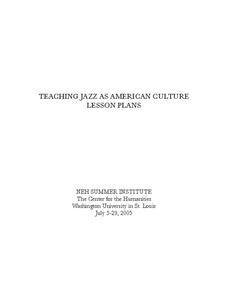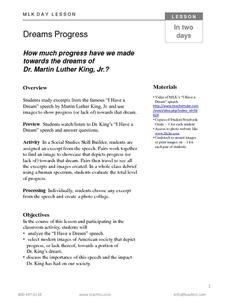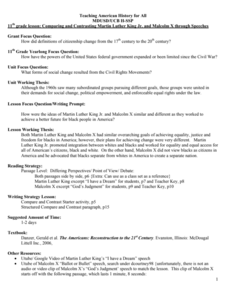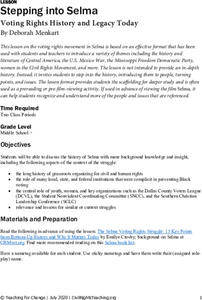Scholastic
Ruby Bridges: A Simple Act of Courage, Grades K-2
A civil rights movement lesson designed specifically with the Common Core State Standards in mind, young learners are introduced to the story of Ruby Bridges as the first African American child to attend an all-white elementary school....
Scholastic
Ruby Bridges: A Simple Act of Courage, Grades 3-5
Through character trait graphic organizers, a vocabulary sorting activity, class discussion, and a civil rights movement slide show, your young historians will be introduced to the amazing story of Ruby Bridges and her experiences as the...
Stanford University
Voices of the Struggle: The Continual Struggle for Equality
As part of a study of the Civil Rights Movement from 1868 to the present, class members examine first person narratives, the Supreme Court case Brown v. Board of Education, and other significant events in civil rights history. They then...
Washington University in St. Louis
Teaching Jazz as American Culture
Jazz and the City, Jazz and the Civil Rights Movement, Jazz and Gender, Jazz and Literature, Jazz and the Arts, Jazz and Film. Here's a packet of unit plans organized around themes that reflect American culture. Each unit examines how...
Defining US
Integration of Education and American Society
How did the struggle for Civil Rights during the 1950s transform American society and politics? Why are American schools integrated today? Class members explore these essential questions by examining a series of primary and secondary...
Alabama Department of Archives and History
How Would You Feel? The Bravery of Civil Disobedience
As part of their study of the US Civil Rights Movement and the Montgomery bus boycott, class members read Dr. Martin Luther King's "Integrated Bus Suggestions." They then craft a short story about the first week of Montgomery bus...
Miama-Dade County Public Schools
African Americans and the Civil War
The American Civil War is the theme of this packet of materials prepared for Black History Month. Class members learn about the roles that African Americans played during the Civil War and examine the African-American experience after...
C-SPAN
Last Days of Martin Luther King, Jr.
On April 4, 1968, Dr. Martin Luther King, Jr. was assassinated in Memphis, Tennessee. Four video clips reveal the events of that time, including the shift in the focus of the Civil Rights Movement, the aftermath of the assassination, and...
National Endowment for the Humanities
"Sí, se puede!": Chávez, Huerta, and the UFW
"Sí, se puede!" Cesar Chavez and Dolores Huerta believed organizing farm workers and changing their working conditions were possible. Scholars examine provisions of the Bracero Program, videos, and the United Farm Workers' (UFW) work....
Atlanta History Center
Civil Disobedience and the Atlanta Student Movement
What tactics are used in civil disobedience? Learners study the conditions in Alabama that led to the establishment of the Atlanta Student Movement, as well as consider the nature and effectiveness of civil disobedience.
TCI
Dreams Progress
Has society progressed to the dream Martin Luther King Jr. expressed in his famous address during the civil rights movement? Learners work with a partner to analyze one excerpt from King's "I Have A Dream" speech and find a current image...
Annenberg Foundation
Egalitarian America
What does a true American represent? Scholars investigate the equal rights era of the 1960s and 1970s in the 20th installment of a 22-part series on American history. Using photographic, magazine, written, and video evidence, groups...
Albert Shanker Institute
Strategizing for Freedom
Booker T. Washington, W.E.B. DuBois, Marcus Garvey, and A. Philip Randolph developed different views on how to advance civil rights for African Americans. Class members research these famous figures and their strategies before developing...
Albert Shanker Institute
The March on Washington Logistics Then and Now
I have a dream ... that all pupils will be able to organize a march of their own after learning about how Bayard Rustin organized the 1963 March on Washington for civil rights. Young reformers work collaboratively examining informational...
Library of Congress
Women's Suffrage Movement Across America
An engaging resource provides many primary source materials to inform a study of the Women's Suffrage Movement. Suggestions include building a timeline of the fight, using the documents as the basis of a DBQ, and/or using a Venn diagram...
National Woman's History Museum
Songs of Protest: Seneca Falls to Vietnam
Long before the songs of the 1960's Peace Movement, long before the songs of the Civil Rights Movement, and even before the songs of the Abolition Movement, were the songs of the Suffrage Movement. To understand the power of protest...
Stanford University
Martin Luther King, Jr. and Malcolm X: A Common Solution?
Much has been made of the differences between Martin Luther King, Jr. and Malcolm X. But was there any common ground between them? Class members reconsider what they think they know about these two civil rights leaders with biographical...
American Institute of Physics
African Americans in Astronomy and Astrophysics
A two-part lesson focuses on the contributions to the fields of astronomy and astrophysics of two African Americans: Benjamin Banneker and Dr. George Carruthers. In part one, scholars learn about Benjamin Banneker by examining his...
American Institute of Physics
The Black Scientific Renaissance of the 1970s-90s: African American Scientists at Bell Laboratories
A two-part lesson asks young scientists to research the contributions of African American scientists at Bell Laboratories. After presenting their findings, class members watch two demonstrations that introduce them to total internal...
Rancocas Valley Regional High School
Teaching American History for All
Although Dr. Martin Luther King, Jr. and Malcolm X both work for equal rights, social change, and political empowerment, their approaches were radically different. To better understand these contrasts, class members compare King's "I...
Teaching for Change
Stepping into Selma
The 1964 Selma to Montgomery, Alabama voting rights marches are the focus of a lesson designed to introduce learners to people who took part in the Civil Rights Movement. Class members set into the role of one of the participants,...
Center for Civic Education
The Power of Nonviolence: What Is Nonviolence? What Does It Cost?
Your young learners will delve into the language of primary source documents in order to identify the characteristics, benefits, and costs of nonviolence. The lesson includes a mix of activities, including an anticipatory activity,...
PBS
Breaking the Code: Actions and Songs of Protest
Ezell Blair, Jr., David Richmond, Franklin McCain and Joseph McNeil changed history. Their sit-in at the lunch counter of the Woolworths in Greensboro, North Carolina on February 1, 1960 became a model for the nonviolent protests that...
Albert Shanker Institute
Who Was Bayard Rustin?
Who was Bayard Rustin? Pupils analyze a series of primary source documents to learn about this important figure in the civil rights movement. The lesson contains a short film to watch along with guiding questions and other resources...




